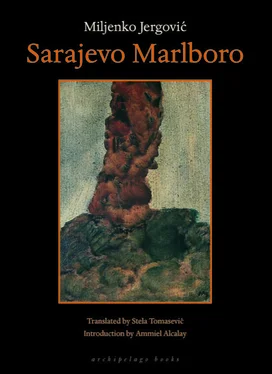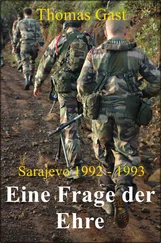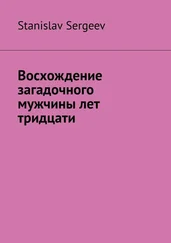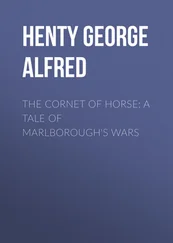Miljenko Jergovic - Sarajevo Marlboro
Здесь есть возможность читать онлайн «Miljenko Jergovic - Sarajevo Marlboro» весь текст электронной книги совершенно бесплатно (целиком полную версию без сокращений). В некоторых случаях можно слушать аудио, скачать через торрент в формате fb2 и присутствует краткое содержание. Год выпуска: 2003, Издательство: Archipelago books, Жанр: Современная проза, на английском языке. Описание произведения, (предисловие) а так же отзывы посетителей доступны на портале библиотеки ЛибКат.
- Название:Sarajevo Marlboro
- Автор:
- Издательство:Archipelago books
- Жанр:
- Год:2003
- ISBN:нет данных
- Рейтинг книги:4 / 5. Голосов: 1
-
Избранное:Добавить в избранное
- Отзывы:
-
Ваша оценка:
- 80
- 1
- 2
- 3
- 4
- 5
Sarajevo Marlboro: краткое содержание, описание и аннотация
Предлагаем к чтению аннотацию, описание, краткое содержание или предисловие (зависит от того, что написал сам автор книги «Sarajevo Marlboro»). Если вы не нашли необходимую информацию о книге — напишите в комментариях, мы постараемся отыскать её.
Sarajevo Marlboro — читать онлайн бесплатно полную книгу (весь текст) целиком
Ниже представлен текст книги, разбитый по страницам. Система сохранения места последней прочитанной страницы, позволяет с удобством читать онлайн бесплатно книгу «Sarajevo Marlboro», без необходимости каждый раз заново искать на чём Вы остановились. Поставьте закладку, и сможете в любой момент перейти на страницу, на которой закончили чтение.
Интервал:
Закладка:
It became fashionable in the workplace to think of yourself as a Yugoslav. But when Ivo T. was asked what he was, he replied, “I must say that I’m a Croat.”
His colleagues were surprised, but he went on, “That’s what I was born and I can’t change it. If you don’t like me as a Croat, why would you like me as a Yugoslav?”
Once again, they lowered their heads and left. That’s what the times were like.
When his son was leaving to study in Zagreb, Ivo T. accompanied him as far as Zenica, embraced him, shoved 100 Deutschmarks into his pocket and said, “The people in Zagreb are just the same as people in Vitez. You have good ones and bad ones. The good ones will like you as long as you don’t forget where you come from.”
It’s hard to know whether the boy paid any attention to his father or not. He wanted to have a good time. He didn’t think about what he was leaving or the life that awaited him in Zagreb. That day a terrible storm broke over Vitez. The sky crashed down. There was talk of a pregnant woman who had been killed by lightning in Kruščica. Some people heard the child cry from inside its dead mother’s belly — but after a while it stopped. Others said the child should have been taken out of its mother while it was still alive. As it is they had to bury an unbaptized soul inside a baptized one. Old women later claimed that such a thing always causes bad luck. It was as if somebody had whispered in the good man’s ear, and persuaded him to remove his son from any misfortune.
Vitez was not bombed during the early months of the war, but as time went by the Muslims and the Croats began to listen to the firebrands among their leaders. They began to look askance at each other and then to set fire to one another’s houses. Each community went its own way — some escaping to Zenica, others from Zenica to neighboring towns. They dug trenches for several weeks and then the chaos began. Wherever you went there was blood and shooting. There was nowhere else to look. They were cramped, and so were we, but everybody felt more or less comfortable until they had to leave their homes. We battled over each field, over plots of land to which none had given a second thought until then. Bosnia shrank like a scarf washed in boiling water.
Ivo T. walked around Vitez like a shadow of his former self. There was nothing left of him. He’d shrivelled up and withdrawn into himself. When the church was hit by a shell, he stood in front of the doors with tears streaming down his cheeks. We were all upset, but we couldn’t understand how it was that he, who’d always been and who always would be a communist, felt even worse about the shelling than the priest did himself.
“Don’t cry, Ivo,” I said. “We’ll fix it easily.” But he just kept repeating that nothing could be fixed any more.
I thought, “What do you mean, you silly old man? Why can’t the church be fixed when the hole’s only half a yard by a yard?”
But I didn’t say anything. I could see that the poor guy had lost the plot, and I didn’t want to say the wrong thing and risk having him break down in front of me.
Except he wasn’t finished. “How can we fix it, Rudo,” he asked, “if with my own eyes I can see the sky where my ancestors could see a bell tower?”
Suddenly I began to choke. I embraced Ivo and hid my face in his coat. We must have stood there for ten minutes — two men leaning on four legs. If you’d separated us, I think we’d both have fallen down and been unable to get up again.
An American came from Zagreb bringing a small parcel from Ivo’s son. Three boxes of cigarettes, a pound of coffee and two cans. That was all the guy could carry. Ivo T. took a couple of the cigarette boxes and went from door to door giving everyone a packet. He kept the third for himself.
That night we all went over for coffee at Ivo’s house. In the middle of the conversation he yelled over to Ruža and asked her to bring the tape recorder. I thought, “What do you need a tape recorder for now when you’ve got machine-guns playing outside?” Ivo said he wanted to send a message back with the American to his son in Zagreb. He didn’t want to write because he felt the boy would take him more seriously if he could hear his voice.
He pulled his wallet out of his pocket, took out a photo and began talking. “My son, evil people have done this to us. Neither your friends nor mine are to blame. Nor is the drunkard Avdo, who punctured the tires on our car a few years ago just because I parked in front of his garage. Nor should we blame the Muslim priest who told his people not to shake hands or kiss Catholics on the days when they slaughter their pigs. The only ones to blame are the evil people. Please don’t let me hear you say that you hate anybody — and God help you if I find out that you’ve sworn at anybody because of what is happening to us. Because I’ll break your legs. Whatever happens, remember what I said. Each ugly word will come back at you like a stone when you are most vulnerable. That’s all from me, study hard and send us something again when you can, but don’t spend too much money, and don’t drink too much, or walk around town late at night. Oh yes, and look after your girlfriend! That’s all from me, son. Love, Dad.”
When he’d finished the recording, nobody said a word. We just sat around the table in silence while the bombing continued outside. When I drank my coffee I thought it tasted kind of salty, which came as a surprise because I hadn’t been crying. Who knows? Perhaps there are secret tear ducts inside a person. That night, in any case, we all cried like babies, even Domo, who had just returned from the front, where he used to spend day after day shooting at people on the other side. Apparently he didn’t sleep a wink that night because he was crying non-stop. The human heart is tender, I guess, especially if you strike it in the right place.
You could write a story about Ivo T., but you’ll have to be careful what you leave in and what you take out! Whatever you do, don’t say that he always was and always will be a communist, and don’t mention that he wouldn’t let his wife enjoy Christmas. Skip the bit about Tito too, and perhaps don’t write that he was president of the local council, because we all know who became the presidents in the old system. Perhaps it would be more sensible to lie and to say that Ivo T. was a priest — except you can’t, now that I think about it, because priests aren’t allowed to marry or have children. Why don’t you just say he was a good guy? That’s all you need to write.
The Gravedigger
Know why you should never bury people in a valley? Because a graveyard needs to be located on a hill somewhere above town. Just imagine you’re climbing up the slope because you want to rest your eyes perhaps, or walk among the tombs flicking through the album of headstone photographs. Let’s say you meet a stranger idling through the deep grass and he expressed an interest in the life story of a person buried up there — well, there you have it! At least if you’re on a hillside, you don’t have to regurgitate the story. You can actually map out the life history of the deceased as it moved through the downtown area, from shop to bar toward the grave. You climb on Alifakovac and meet an Italian, say, who’d like to hear Rasim’s life story, so you recall that Rasim was born in Kovac  — you point with your index finger so the visitor can see. He went to school over there by the bridge, you add, gesturing with your other hand. When he was seventeen he fell in love with the beautiful Mara who lived in Bjelave — look! You can see Bjelave from Alifakovac — but his father wouldn’t allow him to marry her, so he ran away from home and moved into Mara’s house. They hid on Ilidža for three months — Ilidža, by the way, is the mountain you can vaguely see in the fog. Sooner or later his father discovered where Rasim was living and begged him to return to Kovači. Rasim told his father that he would only return if Mara accompanied him. At last, it seems, the old man began to understand that the love affair was serious, and so he brought Rasim and Mara back to Kovači. Except she was not permitted to leave the house in case the neighbors saw her. Hoping to make things up to her, Rasim used to take Mara at night to the rocks above the Jajce barracks. As soon as her eyes grew accustomed to the light she was able to see Bjelave from the rocks. Or perhaps she just imagined that she could see the town. Often she used to cry — and her bout of self-pity lasted for up to a year until Rasim’s father built a house for the young couple in Bistrik — over there, see? That’s Bistrik with the mosque and the brewery and the army camp. Soon after Rasim and Mara moved into the house, the couple were married — but just when you imagined that here was love’s young dream, Mara got ill and died suddenly. She was buried above Širokača — that’s Širokača in the distance, to the left. Her grave lies a few yards apart from the others, possibly because nobody knew whether Mara had in fact remained Mara, or had become Fatima. They couldn’t ask Rasim because he had been struck dumb with grief. He said that he blamed each of the local districts from Kovači to Širokača for her death, and in a fit of pique he sold the house and moved to Vrbanja — that’s Vrbanja, over there. His uncle owned a bakery in the town. At night Rasim used to bake bread. The days he spent mourning his dead bride. People used to say that old Edhem didn’t need to salt his bread, Rasim’s tears were enough.
— you point with your index finger so the visitor can see. He went to school over there by the bridge, you add, gesturing with your other hand. When he was seventeen he fell in love with the beautiful Mara who lived in Bjelave — look! You can see Bjelave from Alifakovac — but his father wouldn’t allow him to marry her, so he ran away from home and moved into Mara’s house. They hid on Ilidža for three months — Ilidža, by the way, is the mountain you can vaguely see in the fog. Sooner or later his father discovered where Rasim was living and begged him to return to Kovači. Rasim told his father that he would only return if Mara accompanied him. At last, it seems, the old man began to understand that the love affair was serious, and so he brought Rasim and Mara back to Kovači. Except she was not permitted to leave the house in case the neighbors saw her. Hoping to make things up to her, Rasim used to take Mara at night to the rocks above the Jajce barracks. As soon as her eyes grew accustomed to the light she was able to see Bjelave from the rocks. Or perhaps she just imagined that she could see the town. Often she used to cry — and her bout of self-pity lasted for up to a year until Rasim’s father built a house for the young couple in Bistrik — over there, see? That’s Bistrik with the mosque and the brewery and the army camp. Soon after Rasim and Mara moved into the house, the couple were married — but just when you imagined that here was love’s young dream, Mara got ill and died suddenly. She was buried above Širokača — that’s Širokača in the distance, to the left. Her grave lies a few yards apart from the others, possibly because nobody knew whether Mara had in fact remained Mara, or had become Fatima. They couldn’t ask Rasim because he had been struck dumb with grief. He said that he blamed each of the local districts from Kovači to Širokača for her death, and in a fit of pique he sold the house and moved to Vrbanja — that’s Vrbanja, over there. His uncle owned a bakery in the town. At night Rasim used to bake bread. The days he spent mourning his dead bride. People used to say that old Edhem didn’t need to salt his bread, Rasim’s tears were enough.
Интервал:
Закладка:
Похожие книги на «Sarajevo Marlboro»
Представляем Вашему вниманию похожие книги на «Sarajevo Marlboro» списком для выбора. Мы отобрали схожую по названию и смыслу литературу в надежде предоставить читателям больше вариантов отыскать новые, интересные, ещё непрочитанные произведения.
Обсуждение, отзывы о книге «Sarajevo Marlboro» и просто собственные мнения читателей. Оставьте ваши комментарии, напишите, что Вы думаете о произведении, его смысле или главных героях. Укажите что конкретно понравилось, а что нет, и почему Вы так считаете.










